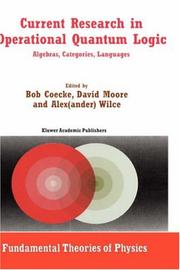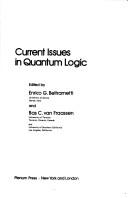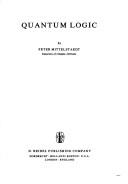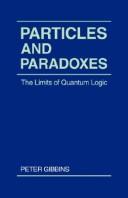| Listing 1 - 10 of 23 | << page >> |
Sort by
|

ISBN: 0792362586 Year: 2000 Publisher: Dordrecht : Kluwer academic,
Abstract | Keywords | Export | Availability | Bookmark
 Loading...
Loading...Choose an application
- Reference Manager
- EndNote
- RefWorks (Direct export to RefWorks)

ISBN: 0306406527 1461332303 1461332281 9780306406522 Year: 1981 Volume: 8 Publisher: New York (N.Y.) : Plenum press,
Abstract | Keywords | Export | Availability | Bookmark
 Loading...
Loading...Choose an application
- Reference Manager
- EndNote
- RefWorks (Direct export to RefWorks)
Quantum logic --- Congresses. --- Quantum logic - Congresses.
Book
ISBN: 3411016957 Year: 1985 Publisher: Mannheim Bibliographisches Institut
Abstract | Keywords | Export | Availability | Bookmark
 Loading...
Loading...Choose an application
- Reference Manager
- EndNote
- RefWorks (Direct export to RefWorks)

ISBN: 9027709254 9400998732 9400998716 9789027709257 Year: 1978 Volume: 126 Publisher: Dordrecht : Reidel,
Abstract | Keywords | Export | Availability | Bookmark
 Loading...
Loading...Choose an application
- Reference Manager
- EndNote
- RefWorks (Direct export to RefWorks)
Quantum logic --- Algebraic logic --- Mathematical physics --- Quantum theory --- Quantum logic.
Book
ISBN: 1351271318 135127130X 1351271326 Year: 2023 Publisher: New York, New York ; London, England : Routledge,
Abstract | Keywords | Export | Availability | Bookmark
 Loading...
Loading...Choose an application
- Reference Manager
- EndNote
- RefWorks (Direct export to RefWorks)
"The aim of Bernard Schmitt's analysis of the monetary economy of production was twofold: to introduce and to explain the logical character of the macroeconomic laws governing our economies, and to explain the origin of the pathologies that follow if these laws are not complied with. Schmitt's main original contributions concern the theories of value, profit, and capital, as well as his explanation of inflation, unemployment and international payments, unified as quantum macroeconomic analysis. This book expounds the key principles of quantum macroeconomic analysis as he conceived and developed them. Schmitt's starting point was the analysis of bank money and the way it is associated with produced output. His macroeconomics was not founded on microeconomics, nor derived from the aggregation of microeconomic variables. Schmitt's theory does not rely on mathematics and modelling either; instead, it is based on logical laws derived from the nature of money and of monetary payments. Part I of this book deals with the quantum macroeconomic analysis of capitalism and its pathologies developed by Schmitt and provides the elements necessary to understand its 'structural' mechanism. Parts II and III deal with the principles of two reforms that enable the passage from capitalism to post-capitalism and from the present non-system of international payments to an orderly system. This book provides essential reading for all those interested in heterodox approaches to macroeconomics, monetary economics, banking, international economics, and history of economic thought. Alvaro Cencini is Emeritus Professor of Economics, University of Lugano (USI), Switzerland"--
Book
ISBN: 128259172X 9786612591723 9048511348 9789048511341 9789085550242 9085550246 Year: 2009 Publisher: Amsterdam Pallas Publications
Abstract | Keywords | Export | Availability | Bookmark
 Loading...
Loading...Choose an application
- Reference Manager
- EndNote
- RefWorks (Direct export to RefWorks)
This dissertation studies the logic behind quantum physics, using category theory as the principal tool and conceptual guide
Quantum theory --- Quantum logic. --- Mathematics.
Book
ISBN: 149851622X 0739180339 9780739180334 9780739180327 0739180320 9781498516228 Year: 2013 Publisher: Lanham Lexington Books
Abstract | Keywords | Export | Availability | Bookmark
 Loading...
Loading...Choose an application
- Reference Manager
- EndNote
- RefWorks (Direct export to RefWorks)
If there is a central conceptual framework that has reliably borne the weight of modern physics as it ascends into the twenty-first century, it is the framework of quantum mechanics. Because of its enduring stability in experimental application, physics has today reached heights that not only inspire wonder, but arguably exceed the limits of intuitive vision, if not intuitive comprehension. For many physicists and philosophers, however, the currently fashionable tendency toward exotic interpretation of the theoretical formalism is recognized not as a mark of ascent for the tower of physics, but rather an indicator of sway—one that must be dampened rather than encouraged if practical progress is to continue. In this unique two-part volume, designed to be comprehensible to both specialists and non-specialists, the authors chart out a pathway forward by identifying the central deficiency in most interpretations of quantum mechanics: That in its conventional, metrical depiction of extension, inherited from the Enlightenment, objects are characterized as fundamental to relations—i.e., such that relations presuppose objects but objects do not presuppose relations. The authors, by contrast, argue that quantum mechanics exemplifies the fact that physical extensiveness is fundamentally topological rather than metrical, with its proper logico-mathematical framework being category theoretic rather than set theoretic. By this thesis, extensiveness fundamentally entails not only relations of objects, but also relations of relations. Thus, the fundamental quanta of quantum physics are properly defined as units of logico-physical relation rather than merely units of physical relata as is the current convention. Objects are always understood as relata, and likewise relations are always understood objectively. In this way, objects and relations are coherently defined as mutually implicative. The conventional notion of a history as “a story about fundamental objects” is thereby reversed, such that the classical “objects” become the story by which we understand physical systems that are fundamentally histories of quantum events. These are just a few of the novel critical claims explored in this volume—claims whose exemplification in quantum mechanics will, the authors argue, serve more broadly as foundational principles for the philosophy of nature as it evolves through the twenty-first century and beyond.
Quantum logic. --- Quantum theory --- Philosophy of nature. --- Nature --- Nature, Philosophy of --- Natural theology --- Algebraic logic --- Mathematical physics --- Philosophy. --- Philosophy --- Quantum theory - Philosophy --- Philosophy of nature --- Quantum logic
Book
ISBN: 1282285866 9786612285868 0080931669 0444528695 9780444528698 9780080931661 Year: 2009 Publisher: Amsterdam ; Oxford : Elsevier,
Abstract | Keywords | Export | Availability | Bookmark
 Loading...
Loading...Choose an application
- Reference Manager
- EndNote
- RefWorks (Direct export to RefWorks)
Quantum mechanics is said to be the most successful physical theory ever. It is, in fact, unique in its success when applied to concrete physical problems. On the other hand, however, it raises profound conceptual problems that are equally unprecedented. Quantum logic, the topic of this volume, can be described as an attempt to cast light on the puzzle of quantum mechanics from the point of view of logic. Since its inception in the famous 1936 paper by Birkhoff and von Neumann entitled, "The logic of quantum mechanics,? quantum logic has undergone an enormous development. Various s
Quantum logic. --- Physics. --- Natural philosophy --- Philosophy, Natural --- Physical sciences --- Dynamics --- Algebraic logic --- Mathematical physics --- Quantum theory

ISBN: 0521336910 0521334985 0511570678 9780521334983 9780521336918 9780511570674 Year: 1987 Publisher: Cambridge Cambridge University Press
Abstract | Keywords | Export | Availability | Bookmark
 Loading...
Loading...Choose an application
- Reference Manager
- EndNote
- RefWorks (Direct export to RefWorks)
Quantum theory is our deepest theory of the nature of matter. It is a theory that, notoriously, produces results which challenge the laws of classical logic and suggests that the physical world is illogical. This book gives a critical review of work on the foundations of quantum mechanics at a level accessible to non-experts. Assuming his readers have some background in mathematics and physics, Peter Gibbins focuses on the questions of whether the results of quantum theory require us to abandon classical logic and whether quantum logic can resolve the paradoxes produced by quantum mechanics. He argues that quantum logic does not dispose of the problems faced by classical logic, that no reasonable interpretation of quantum mechanics in terms of 'hidden variables' can be found, and that after all these years quantum mechanics remains a mystery to us. Particles and Paradoxes provides a much-needed and valuable introduction to the philosophy of quantum mechanics and, at the same time, an example of just what it is to do the philosophy of physics.
Quantum theory --- Physics --- Théorie quantique --- Physique --- Philosophy --- Philosophie --- Quantum logic --- Quantum logic. --- Philosophy. --- Théorie quantique --- History of physics --- Quantum mechanics. Quantumfield theory --- Algebraic logic --- Mathematical physics --- Arts and Humanities --- Physics - Philosophy
Book
ISBN: 3540506799 0387506799 9780387506791 9783540506799 3540460705 Year: 1989 Publisher: Berlin Springer
Abstract | Keywords | Export | Availability | Bookmark
 Loading...
Loading...Choose an application
- Reference Manager
- EndNote
- RefWorks (Direct export to RefWorks)
This volume, that is intended as a research monograph on the conceptual foundations of quantum mechanics, shows new ways of investigation of quantum mechanical problems. At its center is the concept of correlation as it appears in probability theory and quantum physics. It is closely related to and characterizes the possible range of values of quantum correlations, Bell-type inequalities in the Einstein-Podolsky-Rosen experiment, and classical and quantum propositional logic, mentioning only some of the notably questions. The subject has applications in studying problems outside of physics, too. The book includes a detailed construction of local hidden variable theories, based on an extension of classical probability.
530.145 --- Quantum theory --- Quantum logic. --- Logique symbolique et mathématique. --- Théorie quantique. --- Quantenmechanik. --- Wahrscheinlichkeitstheorie. --- Quantenlogik. --- 530.145 Quantum theory
| Listing 1 - 10 of 23 | << page >> |
Sort by
|

 Search
Search Feedback
Feedback About UniCat
About UniCat  Help
Help News
News